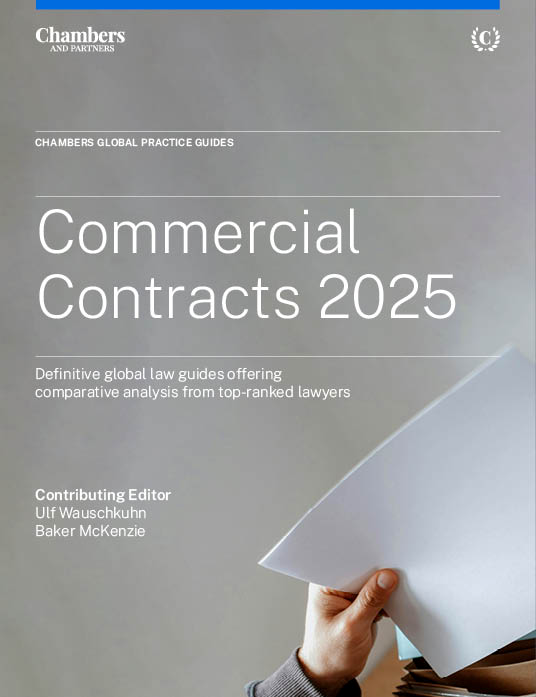
Commercial Contracts 2025
The new Commercial Contracts 2025 guide features over 30 jurisdictions. The guide provides the latest legal information on choice of applicable law, jurisdiction and overriding local laws; contract negotiation, including contract form and battle of forms, standard terms and conditions, and official registration; consumer protection; liability; force majeure and hardship clauses; and warranties and remedies.
Last Updated: December 12, 2025
Compare law and practice by selecting locations and topic(s)
Select Locations

Select Topic(s)

Please select at least one location and one topic to use the compare functionality.
Global Overview of Commercial Contracts in 2025
While the intent for a global economy, with as few restrictions on trade as possible, has existed for some time, the world has dramatically changed in recent years. International commerce is dominated by many geopolitical and macroeconomic factors and, in particular, governments of a number of large countries have adopted a “make my own country strong” policy and care much less for the global economy.
The disputes between the US and China, the Russia-Ukraine war, the attack of Hamas on Israel and its consequences, the India/Pakistan conflict, nationalism, protectionist policies, sanctions and tariffs create serious challenges in supply chains and a highly volatile business environment. In addition, transport of goods from one country to another has become increasingly complicated. All these issues have a great influence on the conclusion of commercial contracts.
Commercial contracts are typically concluded between businesses/companies rather than with consumers. Mandatory legislation now more frequently limits the contractual parties’ freedom to conclude these types of agreements. The mandatory legislation on antitrust, currency protection and anti-bribery has already limited the contractual parties’ freedom for many years. In the past several years, product safety regulations, export control laws, and tariffs legislation, which initially aimed to protect consumers, have become more important in respect of commercial contracts.
The consequence of agreeing on a provision in a commercial contract which violates mandatory legislation is often not only its voidness and unenforceability. Other potential legal consequences are fines imposed by authorities against the contractual parties as well as damage claims of competitors and other affected persons.
AI-generated standard contracts are used more often for the conclusion of non-business critical commercial transactions.
Choice of governing law and jurisdiction/arbitration
In international commercial contracts, it is essential that the parties choose the governing law and jurisdiction. In the vast majority of cases, this choice will ensure that the chosen law will be applied by the chosen court in case of a dispute.
However, a number of countries have enacted super-mandatory laws for the protection of certain local businesses such as commercial agencies and distributors which shall override any chosen governing law and jurisdiction. The agreement of an internationally acknowledged arbitration panel to decide a possible dispute might then be a good alternative if the country of the protected business is a member state of the United Nations Convention on the Recognition and Enforcement of Foreign Arbitral Awards from 1958 (the “New York Convention”).
The main benefits of choosing an arbitration panel versus jurisdiction before a state court are as follows.
- Arbitration awards benefit from the New York Convention, which as of August 2025, has 172 signatory states, making international enforcement more predictable and streamlined.
- The contractual parties can choose neutral arbitrators and venues, avoiding perceived bias in national state courts.
- Arbitrators can be selected for their industry-specific knowledge, which is especially valuable in technical or complex disputes.
- Arbitration proceedings are generally private, unlike public state court hearings.
- Arbitration awards are typically final, reducing the risk of prolonged litigation through multiple appeals.
- The contractual parties can tailor procedural rules, choose the language of the arbitration and even decide on the number of arbitrators.
The main benefits of state courts are the following.
- They are more likely to grant interim measures and summary judgments in urgent matters, which can expedite resolution.
- While in theory arbitration shall be cheaper, in practice it often involves high arbitrator fees and administrative costs, especially with three-member tribunals.
- The underlying contractual party can appeal.
The International Chamber of Commerce (ICC) in Paris is an arbitration organisation which is very often chosen and highly respected in case of international commercial matters.
Conclusion of commercial contracts
While a simple click on a webpage becomes increasingly common in daily life, it is always important to check which forms of a commercial contract are permitted to be concluded with the click of a button for them to be effective under the applicable local law. In a number of jurisdictions, contracts can be concluded orally or by tacit consent. For certain contracts, a signature under a written contract is required, which can then be submitted by paperless contract service providers or as a pdf copy by email. However, sometimes a wet signature on a printed contract is required. A number of jurisdictions require signature in front of a notary public as a necessity for the conclusion of a real estate transaction.
Some jurisdictions require the official registration of certain commercial contracts for their effectiveness.
General terms and conditions are often used by one or both contractual parties and the question arises to what extent they become an integral part of the relevant commercial contract. A battle of forms happens quite often if the contractual parties do not agree which of the parties’ terms shall apply, and the applicable local law will then decide the consequences. Another important issue in respect of general terms and conditions is whether or not one or more clauses might disadvantage the other contractual party unreasonably. The legal consequence might be that the respective clause is invalid, does not become part of the contract and is replaced by applicable statutory law or case law.
UN Convention on the International Sale of Goods
The UN Convention on the International Sale of Goods (CISG) was adopted in 1980 and came into force in 1988. It governs international sale of goods contracts and aims to unify and simplify cross-border commercial sales transactions. As of August 2025, 97 countries had ratified it, including major economies like the United States, Germany and China, though notable absentees include India and the United Kingdom.
The CISG applies when the contractual parties are in different countries and either both are contracting states or private international law leads to a contracting state’s law. The CISG does not apply to sales of stocks, ships, electricity, or goods for personal use, auctions, or where labour/services dominate. The contractual parties can exclude the applicability of the CISG by explicitly stating so in the commercial contract. Otherwise, the CISG will apply automatically.
The CISG primarily governs the conclusion of cross-border sales contracts and the rights of the seller and the buyer, including in case of breach of contract, and available remedies. Some important issues of a commercial sales contract are, however, excluded from the scope of the CISG, such as the validity of the contract, which is then governed by the applicable local law.
Common law versus civil law
The distinction between a common law jurisdiction (such as the UK or the US) and a civil law jurisdiction (such as France, Germany, Italy and Japan) is also important for the conclusion of a commercial contract. The primary source of law in common law is court decisions and in civil law, codified legal statutes. Commercial contracts governed by the law of a common law jurisdiction tend to be more detailed and exhaustive, while commercial contracts that are subject to the law of a civil law jurisdiction are often shorter, relying on statutory provisions to fill gaps.
Typical main negotiation points in commercial contracts
Apart from the subject of delivery/service and the price, some typical main negotiation points for commercial contracts are, for example:
- potential right to change the subject of delivery/service;
- potential right to increase the price;
- potential exclusivity and other restrictions of competition;
- use of IP rights;
- warranty rights;
- indemnification rights;
- liability and potential limitation/caps;
- force majeure and hardship clauses;
- governing law; and
- jurisdiction/arbitration.
Covered jurisdictions
This guide covers key topics related to the law around commercial contracts in jurisdictions such as Brazil, Croatia, France, Egypt, Greece, Italy, Moldova, Switzerland and the UAE
I would like to thank my esteemed colleagues for sharing their knowledge and market intelligence. We all hope that this guide will assist anyone involved in the conclusion of commercial contracts to understand the key legal aspects of the relevant jurisdictions and be more successful in their negotiations.
